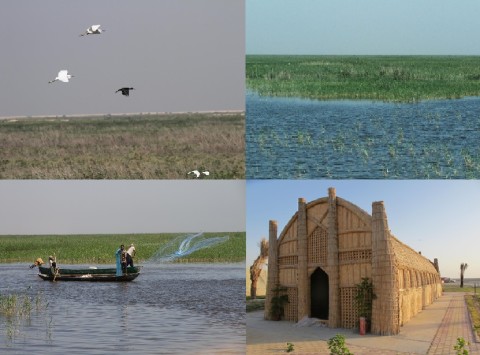
Iraqi Marshlands named a UNESCO World Heritage site
On 17 July the Marshlands of Southern Iraq, often referred to as the ‘Garden of Eden’, were named a UNESCO World Heritage Site.
The famous Mesopotamian Marshlands in the lower floodplains of the Euphrates and the Tigris are the largest wetland in the Middle East. The source of the water for the wetlands is further upstream in the mountains of Turkey, Iraq and Iran. The Ahwar of Southern Iraq, as the marshlands are formally known, are home to hundreds of thousands of birds and at least 40 fish species. The marshes are a stopover point for many migratory birds as they migrate from Central Asia to Africa. These wetlands also play a part in preventing dust storms, which are extremely detrimental to the economy, living conditions and health. They also moderate the temperature in this very hot part of the world. Throughout millennia the area has supported various peoples and their livelihoods, including ancient cultures such as the Sumerians. The World Heritage site unites these natural and cultural aspects.

Wetlands International welcomes the decision to inscribe the marshes on the UNESCO World Heritage List. However, the marshlands face serious constraints to maintain and strengthen the intrinsic values they were inscribed for. The marshes have only partly recovered from severe damage by past drainage and warfare. By 2000, 90% of the marshes had been destroyed due to large scale drainage during the Saddam Hussein regime. After the fall of the regime around 40-60% of the marshes were reflooded.
The partially recovered wetlands and the people who depend on them are now under threat from developments such as large dams and agricultural schemes further upstream, which significantly reduce the amount of water flowing to the marshes. Solutions need to be found so that the precious river water available is used wisely for the marshes, drinking water and agriculture, and that the oil industry does not compete for water nor pollute the area.
We see the marshes’ World Heritage status as an important incentive for increased (international) support for the restoration and protection of these marshes, including the resources they provide to local people. We are hopeful that this nomination will lead to better water management, increased knowledge of its biodiversity values and a sustainable integration of the conservation of the marshlands with social and economic development. We have been working in this region for seven years and were involved in preparing the nomination of the site for World Heritage status. Over the coming years we hope to continue our work to help restore and conserve this iconic wetland and reduce potential impacts from the oil and gas industry.
